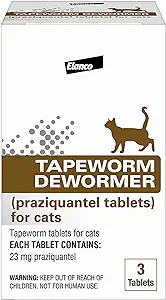What causes the cough stimulus when your cat has a cough
A cat will cough when there is a stimulus in its airways. In this way, his airways try to clear up the cause of the stimulus. That cause is of course a possible danger to your cat. But sometimes the cause just isn’t able to move. For example, the problem is in the lung tissue itself, rather than in the air that the cat has inhaled. But sometimes it just seems like a cat is coughing. He also makes a coughing sound when he tries to expel a hairball from his stomach. In addition, a cat with a cough can also end up in vomiting. This is due to a reflex.
What does a coughing cat sound like?
Describing a cat with a cough always causes people to misunderstand. That is why it is wise to take a look at the following video of a coughing cat. That way you know if your cat is also coughing. In any case, there is an accelerated air movement from the lungs to the outside world. In this way, the body tries to eliminate the cause of the cough through the airways.
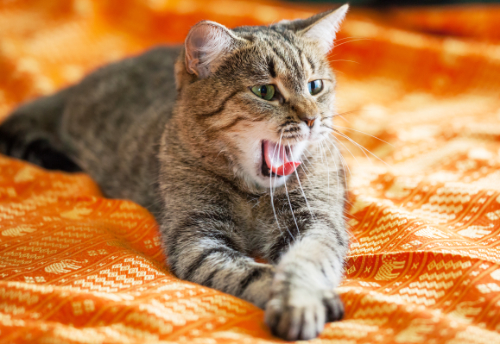
Is it normal for a cat to cough?
Just like humans, every now and than a cat will cough. That is normal. But if your cat coughs several times a day it’s abnormal. In this case it is necessary to search for the cause why your cat has a cough.
What causes a cat to cough?
There are several possible causes for a cat with a cough. The various causes are further elaborated below.
Respiratory infections
The trachea, smaller airways or lungs can become inflamed as a result of a viral or bacterial infection. Cat flu is the most common condition that causes sneezing in particular. But there are also many known cases of cats coughing if there was cat flu. Pneumonia in cats is less common, but it is certainly a possible cause. In that case, the cat always has a fever and also feels quite ill.
You can measure your cat’s body temperature with a human rectal thermometer. You insert the tip of the thermometer into your cat’s anus. He will appreciate using some lubricant if necessary. A normal temperature of a cat is below 39.5ºC (102.5º F). Above that, he has a fever. Incidentally, a fever does not automatically mean that he has pneumonia. Fever can also occur with severe upper airway inflammation like cat flu.
Astma
If there is asthma, the narrow airway tubes in the lungs will swell, resulting in the closure of these airway tubes. This can give you a cat with a cough or a little wheezing, but in severe cases your cat can also become severely short of breath. Astma attacs are pretty often seen in cats.
Allergic reactions
When a cat has an allergic reaction, there are several systems that are affected. In most cases, a cat has skin complaints. Diarrhea can also occur. Much less common are respiratory problems due to an allergic reaction. In this case, it is usually airborne substances such as tree or grass pollen or cigarette smoke that cause a cat with a cough. In severe cases, your cat can also become very stuffy in this case.
Heart failure
In some cats, especially in old age, their heart muscle can thicken. As a result, the heart can pump less blood in the long term. This will cause fluid to accumulate in the chest cavity. This can also cause a coughing stimulus and if it becomes very serious, your cat can have a short of breath. But it always starts with a cat with a cough.
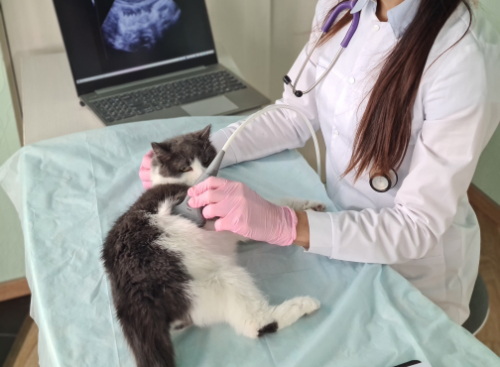
Foreign object
Just like in humans, it is possible that a cat sometimes chokes. An object or food can end up in the trachea and then cause a coughing stimulus. In the vast majority of cases, your cat then coughs the object out of the trachea again. But very occasionally the object can also get stuck in the throat. Your cat will either be in severe respiratory distress. Or it is a small object such as a blade of grass that continues to “tickle” the airways, resulting in a cat with a frequent cough.
Hairballs
As you know, cats also often suffer from hairballs. These hairballs form in the stomach after the cat has washed itself frequently. At some point these hairballs have to come out again. This happens due to the regurgitation of these hairballs. But in most cases, this is accompanied by a sound similar to a cat with a cough. If the hairball is stuck, the cat keeps having a cough. In between coughing attacks due to hairballs, your cat behaves completely normally.
Lungworms
Since i live in the Netherlands i haven’t seen lungworms in cats. They are not a problem in the Netherlands. Lungworms are small worms in the lung tissue or lung blood vessels of a cat. This creates a coughing stimulus and cats can be very stuffy. Sometimes they are even really sick of it. No wonder if your lungs are stuffed with little worms. Your cat can get infected due to faeces of an other cat or by it’s mom after birth.
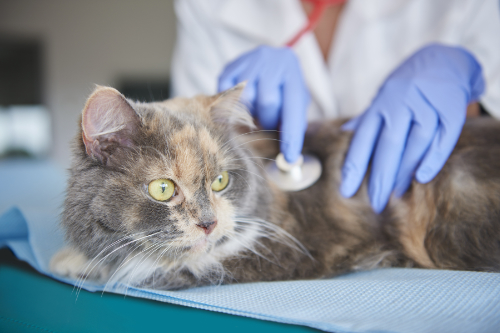
Diagnosis of cough in the cat
If your cat with a cough actually seems to be sick and even has difficulty breathing, it is best to see your vet. He can listen to your cat’s heart and lungs to diagnose or rule out heart problems. He or she can also listen to your cat’s lungs. This will help your vet determine if the problem is in the lungs or trachea. If necessary, he or she can immediately take an X-ray of the lungs to see if there is an accumulation of fluid in the lungs, if there is an infection or if there is an enlarged heart. Based on this, a diagnosis will be made and treatment can be given.
How long can you wait and see what happens?
If your cat has a cough for about half a minute about 5 times a day, you can easily wait a week and see what happens. After all, your cat is quite capable of healing itself in most cases. If he has it more often in one day or if he makes a sick impression, it is wise to visit your vet. A cough itself should only last about 30 seconds at the most. If it is much longer, you should see a veterinarian.
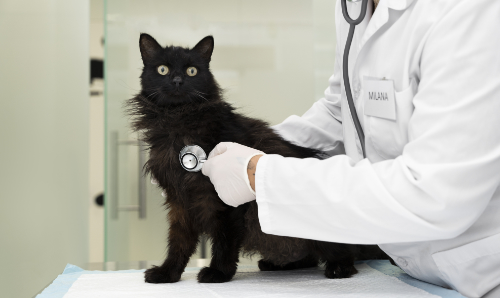
What should I do if my cat is coughing?
As long as your cat with a cough doesn’t seem ill, you can try things yourself. But in that case it is important that your cat has no other symptoms. So he must want to eat well and still be just as active as you are used to. If so, you can try the following:
Dissolve hairballs
In the vast majority of cases, there is a hairball stuck that your cat with a cough is trying to work out of his stomac. This is accompanied by several coughing episodes in a day. You can give an anti-hairball paste for this, of which Cat Lax is one of the better ones.
Give your cat 2.5 cm of paste once a day for 3 consecutive days. It doesn’t matter how you give it. It can be put directly in his mouth, through his food, or smear it on his paws so that he will lick it off. Your cat with a cough should then hardly cough after the 3rd day.
Deworming
Because there can also be lungworms, it is also wise to deworm your cat with a cough. For this you can use the stronger deworming medicine such as Praziquantel. In that case, your cat must receive a treatment once every two weeks, with 3 treatments in total. You will usually notice that the coughing decreases shortly after the first treatment. However, it is important to continue to give the deworming every 2 weeks because otherwise there is a fairly high chance of re-infestation. So do complete the 3 treatments! After that you can stop and see what will happen. If all goes well, you won’t get a cat with a cough anymore.
When do you visit your vet?
An occasional cough in a cat is not necessarily a reason for a vet visit the next day. But it becomes important when your cat coughs, looks sick, seems to be tired or even has a fever. Even if your cat coughs and drools a lot or cannot eat, this is a reason not to wait too long with a vet visit. If your cat is also short of breath, you should even call the emergency vet and have your cat examined quickly. If your cat looks healthy inbetween the cough episodes you can give him the treatments advices above. But if that doesn’t seem to work you still need to see a veterinarian after all.



